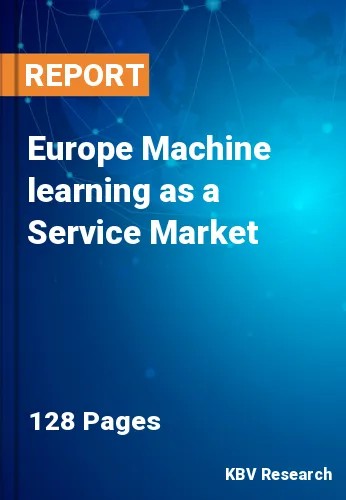The Europe Machine learning as a Service Market would witness market growth of 31.1% CAGR during the forecast period (2022-2028).
Platform as a service (PaaS), Infrastructure as a service (IaaS), and Software as a service (SaaS) are examples of new cloud services that have emerged as a result of the evolution of a product into full-fledged service/s (SaaS). Their rise as a market has sparked a fight for cloud computing capacity. Machine Learning as a Service is joining these cloud-based services and gradually opening up a new rivalry. The growing trend of storing data on the cloud, preserving it, and extracting the most value from it has found a partner in MLaaS, which offers these services at a lower cost.
Machine learning as a service (MLaaS) is a collection of cloud computing services that include machine learning capabilities. MLaaS allows clients to reap the benefits of machine learning without incurring the associated costs, time, and risk of forming an in-house machine learning team. MLaaS can alleviate infrastructure concerns such as data pre-processing, model training, model evaluation, and, ultimately, predictions. Predictive analytics and deep learning, APIs, data visualization, natural language processing, and other tools are available from service providers. The data centers of the service provider handle the computing.
In expanding economies with big populations of competent employees, such as the United Kingdom and Germany, ML technology is becoming more widely used. Customer access to AI-enabled services and goods is affecting the European market even more. In June 2018, the European Union proposed a 10.4 billion-dollar Digital Europe Program for the years 2021-2027. The program's goal is to advance AI technology and spread its uses throughout society and the economy. Such proactive actions are anticipated to open up new market prospects and boost European market growth.
Artificial intelligence (AI) is a critical driver of economic development and a strategic priority. It can help with a variety of issues, including treating diseases and reducing farming's environmental impact. Artificial intelligence allows robots and systems to analyze their surroundings and make autonomous decisions in order to attain certain goals.
AI applications were deployed by 7% of EU businesses with at least ten employees in 2020. While 2% of businesses utilized machine learning to analyze big data internally, 1% used natural language processing, natural language creation, or speech recognition to analyze big data internally. In 2% of the businesses, a chat service was deployed, where a chatbot or virtual agent responded to clients in natural language. Service robots, which have some autonomy, were utilized by the 2% of businesses, to do cleaning, risky or repetitive jobs such as cleaning up harmful chemicals, sorting products in warehouses, assisting clients in shopping or at payment points, and so on.
The Germany market dominated the Europe Machine learning as a Service Market by Country in 2021, and would continue to be a dominant market till 2028; thereby, achieving a market value of $2,375.7 million by 2028. The UK market is estimated to grow at a CAGR of 30% during (2022 - 2028). Additionally, The France market would witness a CAGR of 32% during (2022 - 2028).
Based on End User, the market is segmented into IT & Telecom, BFSI, Manufacturing, Retail, Healthcare, Energy & Utilities, Public Sector, Aerospace & Defense, and Others. Based on Offering, the market is segmented into Services Only and Solution (Software Tools). Based on Organization Size, the market is segmented into Large Enterprises and Small & Medium Enterprises. Based on Application, the market is segmented into Marketing & Advertising, Fraud Detection & Risk Management, Computer vision, Security & Surveillance, Predictive analytics, Natural Language Processing, Augmented & Virtual Reality, and Others. Based on countries, the market is segmented into Germany, UK, France, Russia, Spain, Italy, and Rest of Europe.
Free Valuable Insights: The Global Machine learning as a Service Market will Hit $36.2 Billion by 2028, at a CAGR of 31.6%
The market research report covers the analysis of key stake holders of the market. Key companies profiled in the report include Hewlett-Packard Enterprise Company, Oracle Corporation, Google LLC, Amazon Web Services, Inc. (Amazon.com, Inc.), IBM Corporation, Microsoft Corporation, Fair Isaac Corporation (FICO), SAS Institute, Inc., Yottamine Analytics, LLC, and BigML.
By End User
By Offering
By Organization Size
By Application
By Country
Our team of dedicated experts can provide you with attractive expansion opportunities for your business.

